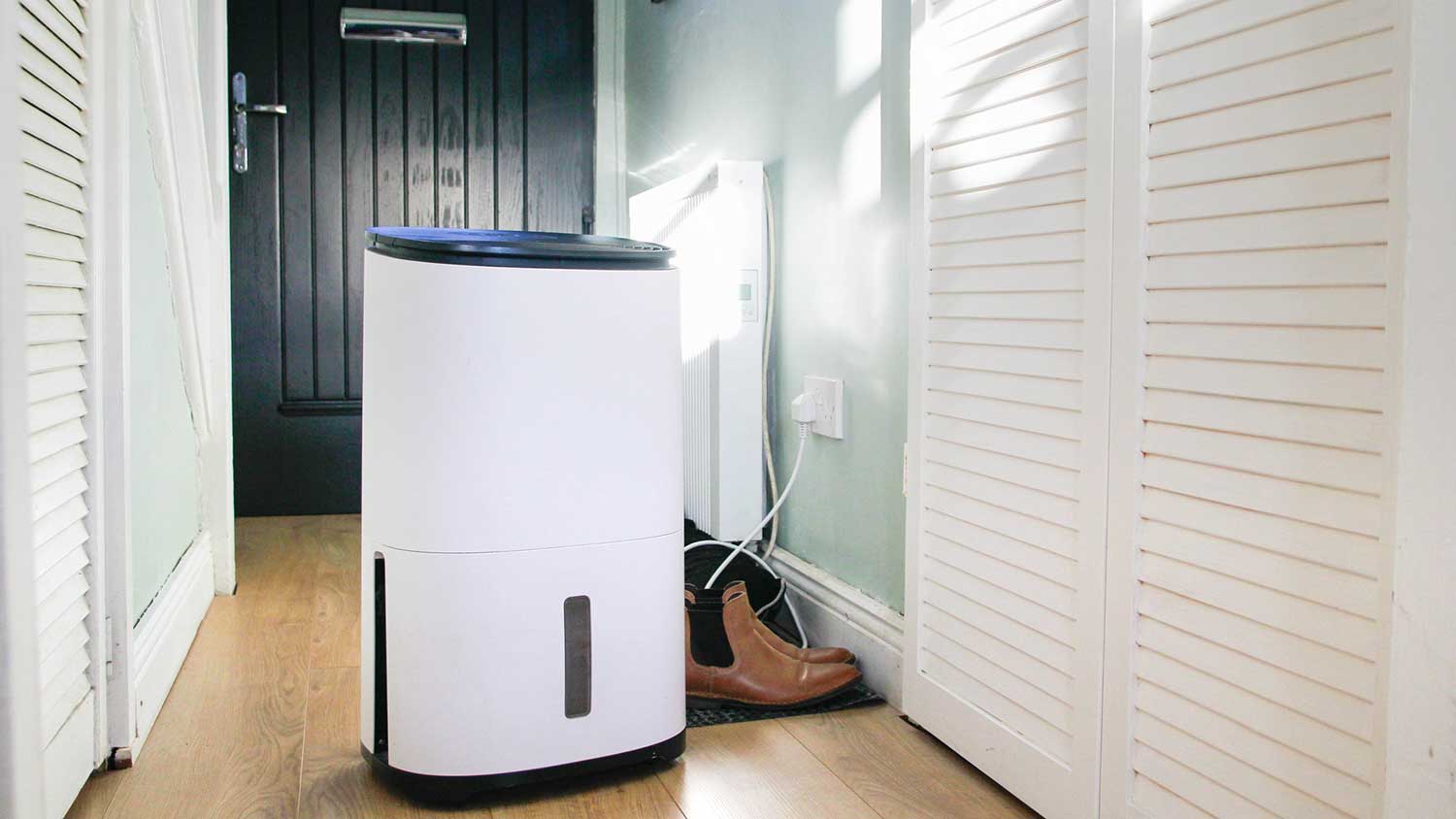How to Quiet a Noisy Air Conditioner
A fussy air conditioner is anything but cool


In the heat of summer, the last thing you want to worry about is whether or not to run the air conditioner because it’s too loud—especially considering the best time to run your AC consistently throughout the day to get the best performance.
Fortunately, whether the noise you’re hearing is a constant low humming, a loud screeching, or a periodic banging, you can do things to reduce noise and keep cool. Keep reading for tips on how to quiet a noisy air conditioner and get to the source of your problem.
Why Is My Air Conditioner Making Noise?
There are a few reasons why you’ve got a noisy air conditioner on your hands. Everything from the age of a machine to issues with parts can cause strange sounds to occur. Here are the possible reasons for the sudden racket and how to tell which one you’re dealing with.
Age
Although buzzing is among the HVAC noises you never want to hear, it is one that an old air conditioning unit can cause. Before looking for other issues, ask yourself when you last updated your air conditioner. Air conditioners typically last 10 to 15 years, so age could be causing all the noise if your machine is in this range.
Along with buzzing, a few other sounds will help you confirm that your machine is reaching the end of its life. Screaming, squealing, and grinding are all sounds of a worn-out AC unit. If any of these noises are familiar, it’s probably time to replace all (or part) of your machine.
Loose Parts
If you’ve ruled out age as your problem, listen closely to figure out what is causing an issue. Rattling or banging sounds typically indicate that your machine has loose parts. Fortunately, this problem is much easier—and less expensive to resolve—than replacing a machine because of old age.
Dust and Debris
Excessive dust and debris build-up in AC units can also lead to unwanted noises. Rattling may be caused by sticks or small rocks that have found their way into the vent from outside. And straining sounds can indicate that a large dust build-up is forcing your machine to work twice as hard. These issues can both easily be remedied by frequent cleanings and regular visits from an HVAC company near you.
Leaking Refrigerant
If your AC unit is making a whistling sound, there’s usually only one culprit: leaking refrigerant. If you suspect this is your problem, look for condensation on AC to confirm, then turn the machine off until a professional has a chance to repair it.
Tips to Reduce Noise From Your Air Conditioner
Now that you know what causes strange AC noises, the following steps will show you how to restore silence to your abode, depending on your specific problem.
1. Check your Compressor and Condenser
Your air conditioner’s compressor (the device that circulates refrigerant during the heating exchange) and condenser (the outside part that collects or releases heat) are the most likely culprits of loud noises coming from your unit, especially if your AC is 10 years or older.
A constant loud buzzing noise is a sign that a motor could wear down—which may be a sign that it’s time to either repair or replace your air conditioner.
2. Tighten Loose Screws
Take a close look at the screws holding your condenser in place. Sometimes, they can come loose and cause the condenser or other parts of your air conditioner to rattle or shake, which can create a loud humming noise.
One of the biggest things that kill your air conditioner is skipping out on AC maintenance. Whether you check on your AC once a year or hire an AC specialist, you should service your air conditioner annually to prolong its life.
3. Clean the Fan Blades

If the condenser’s motor isn’t the source of the noise, there are a few other general AC maintenance tips that could help. For example, dust build-up on fan blades can also increase the volume of your AC.
The best tool for cleaning fan blades is your vacuum. Attach the brush component to your vacuum hose and gently vacuum the blades, being cautious not to push or bend them.
This is also a good time to replace the air filters on your AC unit, which can help your air conditioner run efficiently during summer.
4. Install a Fence Around Your Unit
If your unit doesn’t need replacement, isn’t old, or isn’t dirty, you might just have an abnormally loud air conditioner. Building a small fence around your air conditioner creates a sound barrier between you and your AC unit, which helps muffle noises.
You can build a 3-foot tall fence (with 3 feet of space on all sides) out of plywood for about $20. This is a good way to test if a fence will be the solution for reducing sound. If so, you can install a permanent fence around it later.
Keep in mind, maintaining a 3-foot gap around the perimeter is important. Restricting your AC unit could cause it to overheat, which can damage the unit and reduce its cooling performance in your home.
5. Buy a Sound Blanket
Sound blankets are another good way to stifle noises coming from a loud AC unit.
Many air conditioners design sound blankets to match the make or model of a specific air conditioner. Do research online or contact the company you bought it from for recommendations on which sound blanket you should get.
6. Contact an HVAC Specialist
HVAC lifespans range from 10 to 15 years. If your unit is on the older side and some or all of these tips aren’t helping, it might be worth bringing in a local heating and cooling specialist.
Besides diagnosing your AC’s issues, an air conditioning specialist can also give you tips on which model to install next. One reason your air conditioner might be loud is that you (or the previous owner) installed a unit that’s actually more powerful than your home needs.
New air conditioners are typically quiet and more energy efficient. Replacing your AC could solve your noise problem and save you money on energy bills.
Ben Kissam contributed to this piece.





- Furnace Repair
- Air Conditioning Repair
- HVAC Repairs
- Furnace Installation
- Wood & Pellet Stove Repair
- Dehumidifier & Humidifier Repair
- Heat Pump Companies
- Swamp Cooler Repair
- Wood Stove Services
- HVAC Companies
- Commercial A/C Repair
- Geothermal Installation
- Air Conditioning Installation
- Boiler Repair
- 24 Hour Furnace Repair
- Geothermal Repair
- Heat Pump Repair
- Humidifier Installation
- Thermostat Repair
- Thermostat Installation
- Nest Installation
- Heating & Cooling
- Heating Repair
- Furnace Cleaning
- Furnace Tune-Up
- HVAC Technicians
- Subcontractors
- Furnace Maintenance
- Plumbing & Heating Companies
- Wood Stove Inspection
- Mini Split Installation
- Wall Heater Repair
- Duct Installers
- 11 Common Reasons Your AC Unit Is Making Loud Noises
- Air Conditioning Replacement: Should I Repair or Replace my AC Unit?
- How to Troubleshoot Your Air Conditioner: 12 Common Problems and Tips to Fix Them
- The Best Time to Buy an Air Conditioner
- 11 Reasons Your AC Is Blowing Hot Air
- 5 Reasons Your AC Is Freezing Up and How to Fix It
- Why Annual Air Conditioner Servicing Matters
- How Long Do AC Units Last? Here’s the Average Life Span
- How to Clean Your AC So It Runs All Summer Long
- What Size AC Unit Do I Need for My Home?










